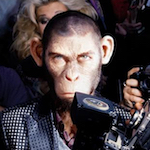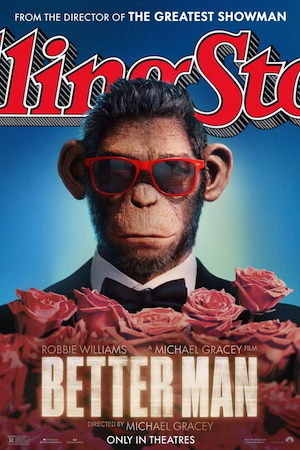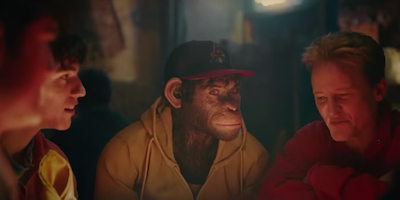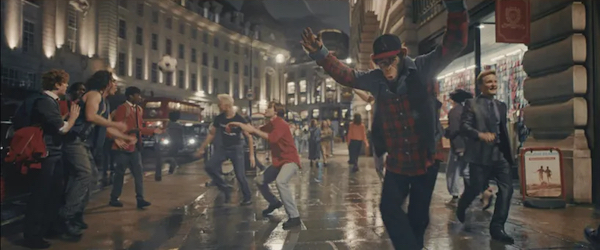 BETTER MAN is a musical biopic of Robbie Williams that came out last week, but according to Slash Film it’s already “the first big box office bomb of 2025,” “a certifiable, massive flop” and “at serious risk of becoming one of the biggest bombs of all time.” There are some theories that it could be because people in North America don’t know who Robbie Williams is, but I would argue that also maybe they don’t know why he’s portrayed in the movie by a realistic CG chimp. Or at least that’s one thing I wonder, and I’ve seen the movie (at a preview screening with friends who are fans and said it might be because he has a song called “Me and My Monkey”?)
BETTER MAN is a musical biopic of Robbie Williams that came out last week, but according to Slash Film it’s already “the first big box office bomb of 2025,” “a certifiable, massive flop” and “at serious risk of becoming one of the biggest bombs of all time.” There are some theories that it could be because people in North America don’t know who Robbie Williams is, but I would argue that also maybe they don’t know why he’s portrayed in the movie by a realistic CG chimp. Or at least that’s one thing I wonder, and I’ve seen the movie (at a preview screening with friends who are fans and said it might be because he has a song called “Me and My Monkey”?)
I was vaguely aware of the human version of Williams – he’s a British pop singer who in 2000 did the song “Rock DJ,” which I think is a good, catchy song even though I don’t approve of the rapping part, if that’s what it’s supposed to be. I had forgotten this but it had a really good video where he’s performing in a club, and slowly strips off all his clothes, then rips off his skin, then muscle, until he’s a skeleton. He’s throwing bloody chunks of himself-meat into the crowd and women are pretty excited about it. Now that I’ve seen the movie I know he was a guy from a boy band, so I can put together that that must’ve been the point when he goes solo and does something provocative to make us see him in a different light, like when Justin Timberlake did that Francis-Lawrence-directed “Cry Me a River” video where he’s a creeper.
The real Williams narrates BETTER MAN in first person and explains that he was “born with jazz hands” and loved to sing Frank Sinatra tunes with his cheeseball dad (Steve Pemberton, MATCH POINT), who he idolizes. This dad straight up sucks, though. Not only does he do the cliche of leaving during the school play so Robbie unsuspectingly looks into the crowd and sees an empty chair, but he does it just to go win a small time stand up competition, which gives him such a big head that he ghosts his family to live somewhere else and host a shitty talent show. Throughout the story he’ll reappear in Robbie’s life when it’s convenient for him, especially after Robbie’s rich and famous, and it takes Robbie decades to finally turn on him.
 As a teen, Robbie auditions for a boy band in Manchester, and though his singing doesn’t impress manager Nigel Martin-Smith (Damon Herriman, Dewey Crowe from Justified and Charles Manson from ONCE UPON A TIME …IN HOLLYWOOD) he wins him over by being a cocky asshole and winking at him. Robbie becomes “the cheeky one” in a group called Take That, who seem like such a parody of ‘90s boy bands I wasn’t sure if they were a composite. (They’re real.) But the other dorks in the group make fun of Robbie, they don’t let him write songs and then he gets kicked out due to his serious drug addiction.
As a teen, Robbie auditions for a boy band in Manchester, and though his singing doesn’t impress manager Nigel Martin-Smith (Damon Herriman, Dewey Crowe from Justified and Charles Manson from ONCE UPON A TIME …IN HOLLYWOOD) he wins him over by being a cocky asshole and winking at him. Robbie becomes “the cheeky one” in a group called Take That, who seem like such a parody of ‘90s boy bands I wasn’t sure if they were a composite. (They’re real.) But the other dorks in the group make fun of Robbie, they don’t let him write songs and then he gets kicked out due to his serious drug addiction.
He falls in love with Nicole Appleton (Raechelle Banno, Home and Away) of the girl group All Saints, makes mean passive aggressive comments when they have a #1 single, fucks up the relationship as bad as the career, does more drugs, wrecks a hotel room or two. There’s a little bit of him being in awe of Liam and Noel Gallagher of Oasis (played by Leo Harvey-Elledge [MIDAS MAN] and Chris Gun). I’m sorry, I don’t know about this shit. My wife laughed when they first showed a Gallagher and I leaned over to ask if it was supposed to be the guy from Jamiroquai.
Robbie’s self-hatred is visualized by repeated scenes where he’s performing and is suddenly distracted by seeing himself in the audience giving a dirty look. It can be himself at different ages but you always know it’s him because he’s the only chimp in the movie.
About that. It’s a metaphor, or something – nobody treats him as an animal, he doesn’t eat bananas or fling his shit, and James Franco doesn’t put him on a leash when he goes to the park. He just happens to appear to us as a humanoid chimp, with only a half-assed attempt to justify it. Narrator Williams makes some comment that he always thought of himself as less evolved than everyone else – an unconvincing reverse-engineering of a gimmick they just wanted to do, I think. It’s pretty much a non-sequitur, and yet it’s a brilliant choice. Usually in a biopic you have an actor portraying the celebrity, and there’s obviously a distancing artificiality there. Here you have to accept that he’s a chimp in the opening moments, so any other inaccuracies or artistic licenses after that become irrelevant.
 More importantly, the rise and fall, the whole walking hard of it all, is recontextualized simply by putting a weird-looking chimp-man in it. I think this movie would be unbearable if it was exactly the same but a human. Watching them carefully place a chimp in the cocaine binge montage and the emotional breakup scene, in front of the mob of flashing camera bulbs, onto the spinning magazine covers, etc. somehow makes it seem fresh.
More importantly, the rise and fall, the whole walking hard of it all, is recontextualized simply by putting a weird-looking chimp-man in it. I think this movie would be unbearable if it was exactly the same but a human. Watching them carefully place a chimp in the cocaine binge montage and the emotional breakup scene, in front of the mob of flashing camera bulbs, onto the spinning magazine covers, etc. somehow makes it seem fresh.
The credits have Williams’ name at the top as himself, so I marveled at how the mo-cap allowed him to play himself at different ages, but it turns out this is not true. Other than the narration and the stage banter in the final performance, the character is played by Jonno Davies (KINGSMAN: THE SECRET SERVICE, BEN-HUR). Even the singing isn’t entirely Williams – he re-recorded his songs, but apparently somebody named Adam Tucker does some vocals too? I didn’t notice though so I guess it’s not for me to complain.
The director is Michael Gracey, an Australian former visual effects artist and director of music videos and commercials. This is is his sophomore feature, after THE GREATEST SHOWMAN. It’s really well put together, great FX, lots of show offy camera moves (cinematographer: Erik Wilson, PADDINGTON 1, 2 and 3, PUMPKINHEAD 3 and 4) and punchy montages (editors: Martin Connor [BURNING MAN, THE RAILWAY MAN], Jeff Groth [THE GRAY MAN], Lee Smith [BATMAN BEGINS] and Spencer Susser [the Rahzel “All I Know” video]). The stand out musical scene is a giant number with a crowd dancing to “Rock DJ” on a soundstage street, done as a oner. In conception very old school but obviously achieved with the aid of various modern technologies.

I came out thinking the movie was more interesting than the person (at least as the movie presents him). The combination of high quality filmmaking and the chimp gimmick were enough to entertain me, and I went along with the notion that Narrator Williams was our friend telling us his story knowing we would be sympathetic to it because we’re nice people. But also I felt like he came across as a superficial person who learns less than he wants us to think he does. In the beginning he claims to only care about fame, which we hope is a front, belied by his self-consciousness about his boy band past. He might care about art more than he says, or at least he’s picky about what type of fame he wants. But he becomes a superstar and does every cliche famous thing up to turning into a total nutcase and best-friend-insulter before the giant concert he always dreamed of. He knows he got everything he wanted but he’s so unhappy he’s going to kill himself. Then he decides not to and becomes a better man, I believe, according to the song. (Not a great title for this movie, in my opinion. Add that to the box office theories.) To be fair, this is a musical, so it’s not that unusual that he gets sober and makes amends in the course of a musical montage. That’s the genre. But it makes it harder to believe.
The big outdoor concert at Knebworth is interesting, partly because of a gimmick I won’t give away, but what I thought was coolest is that for some of it I believe they’re compositing the chimp into real concert footage. Whatever the methods, it doesn’t have that “jesus, why would I watch this green screened garbage instead of the real concert?” problem that BOHEMIAN RHAPSODY had.
The real climax is a slightly more intimate “Evening With Robbie Williams” at Royal Albert Hall that’s the culmination of his relationship with his parents. There is some very effective squirminess when he thanks his mom (Kate Mulvany, ELVIS) for always being there for him and it keeps cutting to his dad looking uncomfortable. Did he think he was about to be mentioned and then feel hurt that he wasn’t? Is he realizing he deserves to be snubbed and feeling like a piece of shit? Either way it’s hard to look at. But after leaving him hanging for a bit Robbie invites his dad on stage for a duet of “My Way,” calling back to the opening of the movie when they sang along with Sinatra in front of the TV. I found it moving that Robbie would choose to forgive his dad, but then Dad apologizes and says something like “Look at you up here, you’re a god!,” acknowledging that he made it.
That’s an important moment for Dad that he finally said that shit, but for the movie to treat it as Robbie’s moment of triumph made me rethink the whole thing and start to believe he really hasn’t become a better man. If he was then he wouldn’t have needed the co-sign of that sleazy fuckin deadbeat. Appreciate it, sure, but need it? I hope you’re talking to your therapist about this.
For me it works best as an unreliable narrator type of story. Williams may laugh about his role as “the cheeky one” in the boy band days, but he’s still playing the part in all this narration where he’s calling people twats and cunts and telling us to fuck ourselves at the end, giving off that same desperate, over-compensating vibe that Bob Saget did after Full House but before the general public accepted him as a legit comedian. Williams spins his hamminess as nostalgia for his dad’s corny vaudevillian humor and showman instincts, but that sort of “Ain’t I a stinker?” act tends to be a defense mechanism for deep insecurity, which fits the person depicted in the movie up until the “I got better though” ending. I was left thinking Narrator Williams might secretly be haunted by some of the questions that had occurred to me while watching: How many acknowledgments that you’re lucky and got everything you want does it take to drown out the sound of the world’s smallest violin? And does deserving happiness necessarily mean you deserve a biopic?
This may sound like additional trivia, but I think it’s the kicker. Williams has a new song on the end credits called “Forbidden Road.” It was nominated for the Best Original Song Golden Globe and shortlisted for the Oscars until it was disqualified for allegedly “incorporating material from an existing song,” specifically, for sounding really fuckin close to “I Got a Name” by Jim Croce. I know that song from DJANGO UNCHAINED so I was kind of shocked how blatantly similar much of this song is.
I can never fathom what the deal is in a situation like that – would you really be that sub-consciously influenced, record and release the song and never have it occur to you, or be pointed out to you? Seems unlikely. But maybe that is the more likely scenario, because what kind of a person would know they copied someone else’s song and assume they can put it on a major motion picture, just play dumb and get away with it?
Maybe nobody. Or maybe the kind of person who would authorize a $110 million humble-brag biopic, and be full of it when he tells you how he always wanted to be famous and then he was but he still hated himself but now it’s fine, he became a better man. I don’t know. Intentional or not, BETTER MAN ends in mystery. But that means I’m still thinking about it. I think I liked it.


























January 16th, 2025 at 1:51 pm
>> Williams may laugh about his role as “the cheeky one” in the boy band days, but he’s still playing the part in all this narration where he’s calling people twats and cunts and telling us to fuck ourselves at the end, giving off that same desperate, over-compensating vibe that Bob Saget did after Full House but before the general public accepted him as a legit comedian.
The “desperate, over-compensating vibe” you describe is why I think he never made it in the US, despite really trying for a couple of years in the early 2000s. I mean, he was EVERYWHERE for a couple of years, when “everywhere” meant MTV awards shows, the cover of magazines like Maxim and Stuff and GQ and Details, etc., etc., etc. But he always felt like “if Guy Ritchie invented a pop singer,” and it never really clicked with Americans. He seemed more annoying than cool. Apparently he was legitimately fucking huge all over the rest of the world, though.